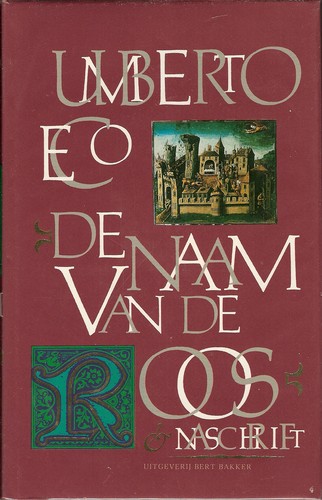nerd teacher [books] reviewed The Name of the Rose by Umberto Eco
Whoever the intended audience is, it isn't me.
2 stars
"It is no accident that the book starts out as a mystery (and continues to deceive the ingenuous reader until the end, so the ingenuous reader may not even realise that this is a mystery in which very little is discovered and the detective is defeated). I believe people like thrillers not because there are corpses or because there is a final celebratory triumph of order (intellectual, social, legal, and moral) over the disorder of evil. The fact is that the crime novel represents a kind of conjecture, pure and simple. But medical diagnosis, scientific research, metaphysical inquiry are also examples of conjecture. After all, the fundamental question of philosophy (like that of psychoanalysis) is the same as the question of the detective novel: who is guilty?" [page 564]
I don't disagree entirely with this take on the novel by its own author, but I find it …
"It is no accident that the book starts out as a mystery (and continues to deceive the ingenuous reader until the end, so the ingenuous reader may not even realise that this is a mystery in which very little is discovered and the detective is defeated). I believe people like thrillers not because there are corpses or because there is a final celebratory triumph of order (intellectual, social, legal, and moral) over the disorder of evil. The fact is that the crime novel represents a kind of conjecture, pure and simple. But medical diagnosis, scientific research, metaphysical inquiry are also examples of conjecture. After all, the fundamental question of philosophy (like that of psychoanalysis) is the same as the question of the detective novel: who is guilty?" [page 564]
I don't disagree entirely with this take on the novel by its own author, but I find it troublesome that he didn't seem to recognise that it is possible to explore the metaphysical and underlying philosophies in ways that don't intentionally misrepresent what the book is about. Though, I also think it's possible to engage with the elements of something (say, whether or not Jesus was impoverished or if he laughed or if those who will die for God or truth [not the same thing] are the antichrist) without having to present them as a mystery novel.
In fact, this comment actually feels like a slap in the face to people who dared to engage with the book's mystery elements and then were disappointed by the reveal of the mystery or were frustrated by the ways in which everything in the book feels designed to cover up that aspect, as if Eco himself didn't quite know what he really wanted to do with the novel but was still quite pleased with it. And I'm not saying he shouldn't have been pleased by having written it or by others (who definitely aren't me) enjoying it, but it feels insulting for this to even be mentioned. Based on my own engagement with this text, I would venture a guess that the mystery was initially the foreground of the novel only to be made secondary because Eco had other things he had wanted to cram into the novel and wanted to focus on. It feels disingenuous to say that the readers were "deceived" into believing there was a mystery because of how little happened with it, since it feels much more like he simply moved on from his original goals and then was forced to tie up those loose ends.
And it's that point that makes me dislike this book, if I'm honest. I don't mind mysteries that have little action or where the detective makes little progress; these are things that already exist, and they have a purpose to explore the process and the world. They're often stories that have parallel narratives taking place, which prompts the readers to ask the questions about both the primary narrative and the secondary narrative. This is fine, but this isn't precisely how The Name of the Rose feels.
It feels like he initially wanted there to be a murder mystery in an abbey (especially if the title he originally planned, The Abbey of the Crime, is any indication), but so much of the book got stuck in providing excruciating details and lists of things that it felt like it changed into a bloated philosophical novel instead.
Honestly, I want to be more pointed in my criticism, but this book actually frustrates me for how much of my time I feel like I wasted. There was a story somewhere, but I couldn't remember it through the lists of details on statues or names of books in the library shelves... I couldn't remember half of what I needed to through the discourse of things that would've been more interesting in an entire other format, rather than something trying to portray itself as a mystery only to have the author (rather pompously) point to how it wasn't truly that (because, I think, he didn't understand the format or potential of such a thing).
Edit: I also very much just need to add that the resolution of this book was so obvious from the outset based entirely on the ravings of a person that, when it was revealed, I threw the book on the floor.


